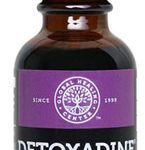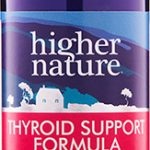For many of us, the thyroid is one of those parts of the body we’re aware exists but don’t tend to think about. So long as it’s working away in the background; it’s not in our thoughts – out of sight, out of mind. So much so, in fact, that many of us probably couldn’t say where it is in our body, what it looks like or even what it actually does. Now, that may be all very well, but the problem arises when something goes wrong.
The thyroid is a gland; it’s bow-tie-shaped and sits at the front of the throat. More importantly, though, it’s a critical component in the endocrine system, which is responsible for the running of the body’s glands, ensuring they generate, distribute and control effectively all the hormones that float about the body and help maintain our wellbeing. In fact, so critical to the endocrine system is the thyroid that it’s sometimes referred to as its ‘leader’, which means that if and when it’s harmed by dangerous toxins – specifically those known as ‘endocrine disruptors’, it can cause serious problems. All the more reason then, not just to be aware of the thyroid, but what thyroid health tips you can follow to look after this most significant of glands.
Stay hydrated – but with fluoride-free water
Unfortunately, even in today’s modern world, the water we have pumped into our taps to drink and bathe in isn’t as clean and pure as it might be. It’s believed that merely 2-5mg per day of fluoride (which is a common trace constituent of tap water) can reduce thyroid function – and, like it not, that’s around about the same amount to be found in many water supplies in the Western world. Consuming fluoride-free water only then, it’s been estimated, could cut by as much as 30% the possibility of your thyroid becoming underactive1.
Avoid toxins as much as you can
Needless to say, trying to avoid the consumption of endocrine inhibitors is enormously important for the thyroid’s wellbeing. Of all such harmful toxins, one kind to be particularly aware of are phthalates. Occurring in cosmetic products and used in the manufacture of plastics to ensure their flexibility, it seems they can also crop up in drinking water2 (another reason to try and ensure the water you consume is as pure as possible).
Get exercise and rest
Important for all-round wellbeing, of course, making sure your lifestyle’s sensible and right is especially crucial for thyroid health. The advantage here is that neither exercise nor getting rest and good sleep need cost you anything – even moderate, light exercise is good, although when you do so you should aim to get your heart rate going. Establishing a good sleep pattern will help to get a good night’s sleep regularly; most people need around seven hours of sleep a night.
Get thyroid-supporting nutrients
Finally, perhaps the most obvious way to boost your thyroid health is to ensure you supply it with the food it requires to work as it should. This means getting the correct nutrients – and enough of them – ideally through your diet. For instance, research suggests that, to help negate the effects of endocrine inhibitors, introducing turmeric into your diet or consuming it as a supplement can do good3.
Principally here, though, we’re talking about the nutrients – the minerals and vitamins – your thyroid needs for its good health and, make no mistake, a pair of such key nutrients are iodine and selenium. In the case of iodine, this is because two of the critical hormones that the thyroid secretes (known as T3 and T4) can only be produced if the body contains enough iodine to use as a building-block in these hormones. So, making sure foods packed with iodine are part of your diet is all-important here (such as plain yoghurt, seafood and seaweed4.
Similarly, although selenium’s called on by the body for the likes of cellular repair, reproduction and DNA synthesis, its biggest deployment comes courtesy of the thyroid in metabolism processes and hormone creation. Diet-wise, this mineral occurs naturally in the likes of Brazil nuts, dairy foods, eggs, grains, seafood and spinach4.
However, if for whatever reason you can’t get decent amounts of these nutrients from your diet, then you’d certainly be wise to consider supplementation. To wit, the following thyroid health supplements are – among many more – available through us at The Finchley Clinic:
Detoxadine – a diet-transformative version of iodine in the form of a daily supplement that’s gentle on the stomach; helps balance iodine levels and supports thyroid health.
Thyroid Support Formula – comprises tyrosine and other key vitamins and minerals to help enable thyroid hormone production and conversion of T3 and T4; combines very well with Kelp Formula.
Drive! – also contains tyrosine (along with other supportive nutrients) to support improved energy, balanced brain chemistry, good mental health and the adrenal and thyroid glands.
References:
1. Peckham, S. et al. ‘Are fluoride levels in drinking water associated with hypothyroidism prevalence in England? A large observational study of GP practice data and fluoride levels in drinking water’. Journal of Epidemiology & Community Health. Feb 2014.
2. Li N. et al. ‘Dibutyl Phthalate Contributes to the Thyroid Receptor Antagonistic Activity in Drinking Water Processes’. Environ. Sci. Technol. 2010. 44 (17): pp 6863–6868.
3. Jurenka J. S. ‘Anti-inflammatory properties of curcumin, a major constituent of Curcuma longa: a review of preclinical and clinical research’. Altern Med Rev. Jun 2009.14 (2): 141-53.
4. ‘Iodine’. National Institutes of Health: Office of Dietary Supplements. USA.gov. Last updated: June 2011.



